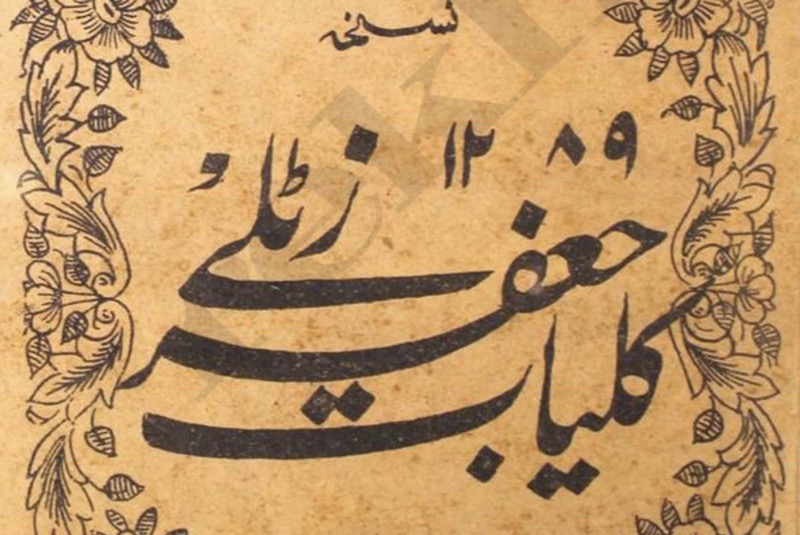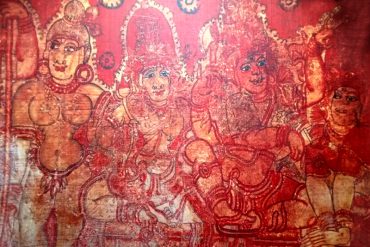Mir Mohammad Ja’far, known as Zatalli, was a remarkable figure who defied conventions in many ways. Not only was he an early pioneer of Urdu literature, but he also possessed an unrestrained passion for words.
Zatalli held several notable distinctions in the Urdu literary landscape. He was the first Urdu satirist, humorist, and social commentator who fearlessly critiqued social and political issues. Moreover, he was one of the foremost writers of Urdu’s explicit and risqué prose and verse, breaking boundaries and challenging societal norms. Additionally, Zatalli can be credited as the first Urdu prose writer in Northern India, further establishing his significance in Urdu literature.
Mir Mohammad Ja’far composed the following lines, which are believed to have led to his alleged death by tasma kashi (choking through shoelace):
The prevailing currency is of dal and peas
Because of the Emperor Farrukh Seer
Is the one who kills people with his shoelace.
These lines were a satirical parody of the coins issued after Emperor Farrukhsiyar’s sikkah. Originally, the lines read:
By the grace of the true God, struck coin on silver and gold.
The Emperor of land and sea, Farrukh Siyar.
Zatalli, born into a distinguished Shia Muslim Sayyid family in Haryana, had an unknown date of birth. While little is known about his personal life, one intriguing detail that emerged was his marriage to two wives by the age of 60, as he humorously expressed in a short poem:
Ja’far, you spent your life in frivolities, and now at the age of sixty, you have acquired two wives!
Zatalli employed a hajju (lampooning) style of writing in his criticisms, which can be found in his collection called ‘Kulliat – i – Jafar Zatalli.’ He fearlessly targeted various individuals and groups in his satirical works, including maulvis, princes, clergymen, government officials, elite families (including women) – specifically Prince Kam Baksh, Mirza Zulfiqar Beg (the Kotwal of Delhi), and Sabha Chand Khatri (an important functionary of Zulfiqar Khan, known for his hypocritical behaviour and corruption).
In the realm of Urdu literature, a remarkable figure’s work has been overshadowed and largely forgotten due to his “unorthodox style and controversial” content. Mir Mohammad Ja’far, better known by his pen name Zatalli, was a satirist and humorist who fearlessly criticised the nobility and religious leaders of his time.
Hailing from a Shia Muslim Sayyid family in Haryana, Zatalli employed a unique fusion of Urdu and Persian, known as “rekhta,” to illuminate the prevailing hypocrisy and moral double standards within Mughal society.
The Unconventional Wordsmith
Zatalli’s writings defied conventional boundaries, weaving together Urdu and Persian to create a linguistic tapestry that challenged traditional norms. While drawing from established Persian literary conventions, he showcased his mastery of Urdu, seamlessly blending the two languages.
His compositions represented early examples of literary endeavours in Urdu when the language was still in its formative stages. By juxtaposing Indic words and phrases with Persian expressions, Zatalli transcended linguistic and cultural limitations, impacting Urdu literature.
A Satirical Trailblazer
Zatalli’s most significant contribution to Urdu literature lies in his role as a satirist. Through his distinct writing style, characterised by lampooning and incisive criticism, he fearlessly targeted maulvis, princes, clergymen, government officials, and the elite.
No one was spared from his biting pen, including Prince Kam Baksh, Mirza Zulfiqar Beg, and Sabha Chand Khatri. Zatalli’s acerbic commentary and biting humour exposed the rampant duplicity within Mughal society, laying bare the stark disparities between moral righteousness and societal realities.
The Controversial Legacy
During his time, Zatalli’s works were often dismissed as obscenely clownish and inconsequential. The feudalistic society of the era, burdened by strict dichotomies of moral right and wrong, labelled him a vulgar madman.
His writings, replete with coarse language and explicit content, aimed to elicit strong reactions and force readers to confront the societal double standards that fueled his outrage. However, the absence of a poetic framework to vindicate and validate his obscenities limited the reception and recognition of his work.
Personal Turmoil and Reflections
Beyond his scathing critiques, Zatalli revealed glimpses of personal turmoil through his poetry. Following his dismissal from Prince Kam Baksh’s employ, he expressed unhappiness and uncertainty about the future. These moments humanise Zatalli, portraying a man affected by the turbulence in his life while remaining unapologetic for his offensive ridicule and cutting obscenities directed at the ruling class.
The Unsung Literary Wizard
Urdu scholars largely overlooked Zatalli’s legacy, dismissing him as insignificant and unworthy of the poet’s title. His unorthodox style and controversial content led many to reduce his work to unintelligible gibberish. Nevertheless, his significance lies in pioneering the fusion of formal Persian with the colloquial language of the masses. Zatalli’s words were so impactful that they allegedly led to his demise, choking him through the very “tasma kashi” (choking with a shoelace) he mocked in his verses
*This article was updated to rectify errata in the previous version.
-30-
Copyright©Madras Courier, All Rights Reserved. You may share using our article tools. Please don't cut articles from madrascourier.com and redistribute by email, post to the web, mobile phone or social media.Please send in your feed back and comments to [email protected]











